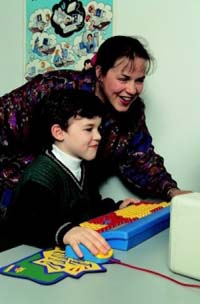| Knowledge
Versus Information Access
Most people
confuse information access with knowledge. Many people have
access to information with computers at school, work and home.
Few people have the "know-how" to find, create, edit, manage,
analyse, critique, cross-reference and transform information
into usable knowledge. Perhaps the confusion about knowledge
versus information is the most serious widespread misconception
in the current use of information technology.
Working
with Kids
- Help
children get started with new programs and safely explore
on-line resources.
- Let
children operate the computer and develop their own sense
of control. Avoid the temptation to jump in and show them
how.
- Encourage
children to explore software freely. Give children time
to work through problems themselves. Learning how to correct
mistakes and solve problems helps children become more self-sufficient
computer users. Explain that mistakes are part of the learning
process.
- Encourage
your child to use the computer for homework, accessing the
latest news, research, communication and other projects.
- Let
your child "play teacher". You'll be surprised what your
children can teach you. Make sure your child knows you are
learning from them.
- Build
a good software library. Make sure you get value from your
existing titles before you buy more.
- Encourage
your child to use different hardware devices - printer,
scanner, microphone, CD-ROM, speakers, etc.
- Create
a portfolio of your child's computer work. Post printouts
on the walls.
- Have
fun! Happiness is contagious. When learning is easy and
fun, everyone excels.

Getting
the Most Out of Your Home Computer
- Invest
in appropriate furniture, lighting and other accessories
(such as a CD rack).
- Get
help. Stress and frustration create barriers to success.
- Encourage
usage by example. Designate times to work alone and together
with family members.
- Avoid
letting your children turn the computer into a video arcade.
Avoid software with violence or negative reinforcement.
Encourage computer skill development, creativity and the
usage of the computer as a tool to do homework, research
and other projects.
- Target
skill areas you wish to develop with your children. Buy
a couple of recommended software titles by leading publishers
that meet your needs.
- Set
guidelines and responsibilities for each family member.
- Be
prepared to invest in additional hardware, software and
computer training. Technology changes rapidly. Computer
hardware and software does not have a life cycle similar
to other household appliances.
For more
information, simply click on a link
or contact your nearest Fourth R
Learning Centre.
|